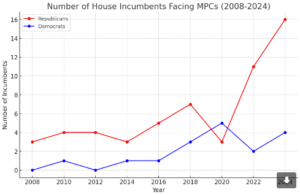By Jeff Blaylock – Founder & Senior Editor
JAN. 5, 2023
If it seems to you like more Republican House incumbents are facing multiple primary challengers (MPCs), then your perceptive powers are accurate. This cycle, 16 House Republicans are facing MPCs. This is the most in any election cycle in state history, breaking the previous record of 11 set in 2022.*
The 2022 and 2024 cycles are the only two to have double-digit incumbent House Republicans facing MPCs and only the third since at least 1996 to have at least 10 MPC races against all incumbent representatives (2018 had 10.).
The vast majority of Texas House seats are effectively decided in the primary because the current redistricting map created precious few competitive seats. The choice for voters, then, is not between parties, but instead which kind of Republican in red districts or Democrat in blue districts will represent me.
Beginning with the 2008 cycle, the bulk of intra-party conflict involving MPCs has occurred in the Republican primary. Of the 53 House incumbents facing MPCs, 40 of them were Republicans (75%). This year, 16 of the 20 are Republicans (80%). By contrast, only four House Democrats, all members of the Texas Legislative Black Caucus, face MPCs.
Since 2008, House incumbents facing MPCs have won 30 of their primary races outright (without a runoff), and another 21 were forced into runoffs. Only two – Democrats Naomi Gonzalez (2014) and Dawnna Dukes (2018) – finished third or lower in the primary. Runoffs have not generally been kind to incumbents, but they aren’t death sentences, either. Incumbents have won seven of the 21 runoffs MPCs have forced them into (33%). Overall, the incumbents have won renomination, either in the primary or runoff, in 70% of the time they had MPCs.
In prior cycles, the challengers typically branded the incumbents as RINOs or campaigned to their right, claiming the incumbents were insufficiently conservative. This year, there are two specific issues – two specific votes, actually – that seem to be driving many of the challenges. Every one of the 16 House Republicans facing MPCs voted to impeach Ken Paxton and half of them voted for retiring Rep. John Raney’s amendment removing school choice provisions from the education bill during a November special session.
The January semi-annual reports and, perhaps more so, the 30-day-out reports will provide more insight into which challengers have leveraged Paxton’s and/or Abbott’s endorsements into the cash and in-kind resources needed to oust an incumbent.
*For purposes of this analysis, we ignored the Senate, where incumbents rarely face a serious challenge, and Congress, where MPCs are a pretty common and highly unsuccessful occurrence.*


